183 scholarly books by Assoc of College & Research Libraries and 12
start with E
183 scholarly books by Assoc of College & Research Libraries and 12
183 scholarly books by Assoc of College & Research Libraries
12 start with E start with E
12 start with E start with E

Embedded Librarians
Moving Beyond One-Shot Instruction
Cassandra Kvenild
Assoc of College & Research Libraries, 2011

Empathy by Design
Empathy-Driven Marketing for Libraries
Sabine Jean Dantus
Assoc of College & Research Libraries, 2024
The library is a universal resource where knowledge and information meet. To advertise this resource and advance equal access in positive ways, libraries must develop strategies, campaigns, and messages that show they care about the lives of their diverse communities.
Empathy by Design: Empathy-Driven Marketing for Libraries offers step-by-step strategies for understanding why people visit the library and tailoring your marketing with personalization that resonates with users on a deeper level. It provides real-world solutions for understanding your target audience through empathy and demonstrates how to gather and use data to develop messages and programming that fosters meaningful connections and engagement. You’ll find ideas for understanding the customer journey, creating an empathic library brand, and creating empathy-driven marketing strategies, campaigns, content, and tactics.
Today’s library marketers should both understand the effectiveness of using empathy in marketing and use it as a radical tool for advancing our profession’s values of diversity, equity, inclusion, and access. The strategies outlined in Empathy by Design can give you the tools you need to make your marketing—and your library—more targeted and empathic.
Empathy by Design: Empathy-Driven Marketing for Libraries offers step-by-step strategies for understanding why people visit the library and tailoring your marketing with personalization that resonates with users on a deeper level. It provides real-world solutions for understanding your target audience through empathy and demonstrates how to gather and use data to develop messages and programming that fosters meaningful connections and engagement. You’ll find ideas for understanding the customer journey, creating an empathic library brand, and creating empathy-driven marketing strategies, campaigns, content, and tactics.
Today’s library marketers should both understand the effectiveness of using empathy in marketing and use it as a radical tool for advancing our profession’s values of diversity, equity, inclusion, and access. The strategies outlined in Empathy by Design can give you the tools you need to make your marketing—and your library—more targeted and empathic.
[more]
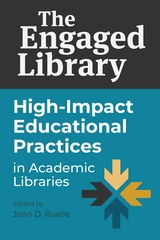
Engaged Library
High-Impact Educational Practices in Academic Libraries
Joan Ruelle
Assoc of College & Research Libraries, 2020

Environments For Student Growth And Development
Library
Lisa Hinchliffe
Assoc of College & Research Libraries, 2012
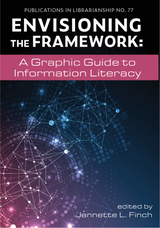
Envisioning the Framework
Jannette Finch
Assoc of College & Research Libraries, 2021
Data visualization—making sense of the world through images that tell a story—has a history that parallels human existence. The strength of visualization lies in its ability to reveal truth out of information that may remain hidden in lines of text, large data sets, or complex ideas. The Framework for Information Literacy for Higher Education presents complex threshold concepts, developed intentionally without prescriptive lists of skills and with flexible options for implementation, which can be explored and understood through visualization.
Envisioning the Framework offers a visual opportunity for thought, discovery, and sense-making of the Framework and its concepts. Seventeen chapters packed with full-color illustrations and tables explore topics including:
Twenty-first-century information literacy involves the metaliterate learner, reflects seismic changes in the duties and roles of teaching librarians, requires new partnerships with faculty and instructional designers, and emphasizes continuous assessment practices. Envisioning the Framework can help you use symbols and visuals for deeper understanding of the Framework, to map the Framework with teaching and learning objectives, and to tell a coherent story to students featuring the frames and the Framework.
Envisioning the Framework offers a visual opportunity for thought, discovery, and sense-making of the Framework and its concepts. Seventeen chapters packed with full-color illustrations and tables explore topics including:
- LibGuides creation through conceptual integration with the Framework
- fostering interdisciplinary transference
- the convergence of metaliteracy with the Framework
- teaching multimodalities and data visualization
- mapping a culturally responsive information literacy journal for international students
Twenty-first-century information literacy involves the metaliterate learner, reflects seismic changes in the duties and roles of teaching librarians, requires new partnerships with faculty and instructional designers, and emphasizes continuous assessment practices. Envisioning the Framework can help you use symbols and visuals for deeper understanding of the Framework, to map the Framework with teaching and learning objectives, and to tell a coherent story to students featuring the frames and the Framework.
[more]
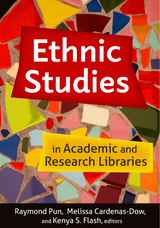
Ethnic Studies in Academic and Research Libraries
Raymond Pun
Assoc of College & Research Libraries, 2021
Supporting ethnic studies is an opportunity to uplift diverse stories and perspectives and to build and affirm such communities and their voices, experiences, and histories. Ethnic studies librarianship requires engagement, a desire to listen and engage with one’s constituents, and a focused approach to re-humanizing and emphasizing the voices of those who are being studied. Race and ethnicity, despite their abstractness, have real, concrete meaning and consequences in American society. Being able to see who speaks and who is silenced matters, and ethnic studies librarianship supports the intellectual journey of students in becoming aware of the various ways we see the world and the numerous stories we tell and come across in our lifetime.
Ethnic Studies in Academic and Research Libraries serves as a snapshot of critical work that library workers are doing to support ethnic studies, including areas focusing on ethnic and racial experiences across the disciplines. Other curriculums or programs may emphasize race, migration, and diasporic studies, and these intersecting areas are highlighted to ensure work supporting ethnic studies is not solely defined by a discipline, but by commitment to programs that uplift underserved and underrepresented ethnic communities and communities of color. Twenty chapters are broken into three thorough sections:
Ethnic Studies in Academic and Research Libraries serves as a snapshot of critical work that library workers are doing to support ethnic studies, including areas focusing on ethnic and racial experiences across the disciplines. Other curriculums or programs may emphasize race, migration, and diasporic studies, and these intersecting areas are highlighted to ensure work supporting ethnic studies is not solely defined by a discipline, but by commitment to programs that uplift underserved and underrepresented ethnic communities and communities of color. Twenty chapters are broken into three thorough sections:
- Instruction, Liaison Engagement, and Outreach
- Collections Projects and Programs
- Collaborations, Special Projects, and Community Partnerships
[more]
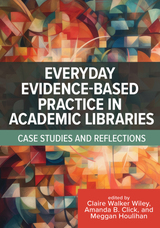
Everyday Evidence-Based Practice in Academic Libraries
Case Studies and Reflections
Clare Walker Wiley
Assoc of College & Research Libraries, 2023
Evidence-based practice (EBP) in academic librarianship is embedded in the way we approach our work. An EBP project might be a yearlong study with many types of evidence collected or a simple assessment that helps you make a small adjustment to your work. Large or small, EBP is a way of operating day-to-day.
Everyday Evidence-Based Practice in Academic Libraries: Case Studies and Reflections collects excellent, thorough examples of EBP across functional areas of academic libraries and includes many evidence types in a variety of contexts. Five sections explore:
Everyday Evidence-Based Practice in Academic Libraries offers high-quality evidence from a variety of perspectives and inspires a commitment to evidence-based practice in your day-to-day work and library culture.
Everyday Evidence-Based Practice in Academic Libraries: Case Studies and Reflections collects excellent, thorough examples of EBP across functional areas of academic libraries and includes many evidence types in a variety of contexts. Five sections explore:
- Understanding Users
- Leadership and Management
- Instruction and Outreach
- Collections
- Open Initiatives
Everyday Evidence-Based Practice in Academic Libraries offers high-quality evidence from a variety of perspectives and inspires a commitment to evidence-based practice in your day-to-day work and library culture.
[more]

The Expert Library
Staffing, Sustaining, And Advancing The
Scott Walter
Assoc of College & Research Libraries, 2011

The Expert Library
Staffing, Sustaining, and Advancing the Academic Library in the 21st Century
Scott Walter
Assoc of College & Research Libraries, 2011
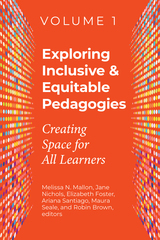
Exploring Inclusive & Equitable Pedagogies
Creating Space for All Learners
Melissa Mallon
Assoc of College & Research Libraries, 2023
Inclusive and equity-minded pedagogy is inspired by a rich array of theories including Black feminist thought, critical race theory, cultural humility, cultural competence, disabilities studies, universal design for learning, and critical information literacy. When we base our instruction on inclusive and equitable pedagogies, we endeavor to connect authentically with students as well as to connect classroom learning to the context of their lives. We share power with students, centering them and their varied learning preferences, and strive to create a culture of care, empathy, and humility both in and out of the classroom. When we clearly share our objectives and expectations for a learning experience, students may better understand us and the learning context we aspire to create.
In Exploring Inclusive & Equitable Pedagogies: Creating Space for All Learners, seven thorough sections across two volumes examine:
Chapters cover topics including dismantling, reexamining, and reconstructing notions of authority in information literacy instruction; teaching technology inclusively; using primary sources to research queer and feminist histories; cocreating knowledge practices with students; prioritizing accessibility in synchronous and asynchronous learning environments; cultural humility, funds of knowledge, and information literacy instruction with first-generation students; designing and managing inclusive group projects; and much more.
To become the instructors our students need, we must adopt the mindsets and develop the underlying skills to enact inclusive and equitable teaching and learning. Exploring Inclusive & Equitable Pedagogies offers reflections, practices, and models that deepen our collective understanding of equitable and inclusive theories and practices and present new grounding for both our individual teaching and our instruction programs.
In Exploring Inclusive & Equitable Pedagogies: Creating Space for All Learners, seven thorough sections across two volumes examine:
- Anti-Racist Approaches
- Intentional Information Literacy
- Engendering Care and Empathy
- Community Building
- Universal Design for Learning: An Important Benchmark
- Instructor Identity and Positionality
- Professional Development
Chapters cover topics including dismantling, reexamining, and reconstructing notions of authority in information literacy instruction; teaching technology inclusively; using primary sources to research queer and feminist histories; cocreating knowledge practices with students; prioritizing accessibility in synchronous and asynchronous learning environments; cultural humility, funds of knowledge, and information literacy instruction with first-generation students; designing and managing inclusive group projects; and much more.
To become the instructors our students need, we must adopt the mindsets and develop the underlying skills to enact inclusive and equitable teaching and learning. Exploring Inclusive & Equitable Pedagogies offers reflections, practices, and models that deepen our collective understanding of equitable and inclusive theories and practices and present new grounding for both our individual teaching and our instruction programs.
[more]
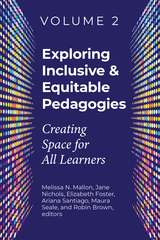
Exploring Inclusive & Equitable Pedagogies
Creating Space for All Learners
Melissa Mallon
Assoc of College & Research Libraries, 2023
Inclusive and equity-minded pedagogy is inspired by a rich array of theories including Black feminist thought, critical race theory, cultural humility, cultural competence, disabilities studies, universal design for learning, and critical information literacy. When we base our instruction on inclusive and equitable pedagogies, we endeavor to connect authentically with students as well as to connect classroom learning to the context of their lives. We share power with students, centering them and their varied learning preferences, and strive to create a culture of care, empathy, and humility both in and out of the classroom. When we clearly share our objectives and expectations for a learning experience, students may better understand us and the learning context we aspire to create.
In Exploring Inclusive & Equitable Pedagogies: Creating Space for All Learners, seven thorough sections across two volumes examine:
Chapters cover topics including dismantling, reexamining, and reconstructing notions of authority in information literacy instruction; teaching technology inclusively; using primary sources to research queer and feminist histories; cocreating knowledge practices with students; prioritizing accessibility in synchronous and asynchronous learning environments; cultural humility, funds of knowledge, and information literacy instruction with first-generation students; designing and managing inclusive group projects; and much more.
To become the instructors our students need, we must adopt the mindsets and develop the underlying skills to enact inclusive and equitable teaching and learning. Exploring Inclusive & Equitable Pedagogies offers reflections, practices, and models that deepen our collective understanding of equitable and inclusive theories and practices and present new grounding for both our individual teaching and our instruction programs.
In Exploring Inclusive & Equitable Pedagogies: Creating Space for All Learners, seven thorough sections across two volumes examine:
- Anti-Racist Approaches
- Intentional Information Literacy
- Engendering Care and Empathy
- Community Building
- Universal Design for Learning: An Important Benchmark
- Instructor Identity and Positionality
- Professional Development
Chapters cover topics including dismantling, reexamining, and reconstructing notions of authority in information literacy instruction; teaching technology inclusively; using primary sources to research queer and feminist histories; cocreating knowledge practices with students; prioritizing accessibility in synchronous and asynchronous learning environments; cultural humility, funds of knowledge, and information literacy instruction with first-generation students; designing and managing inclusive group projects; and much more.
To become the instructors our students need, we must adopt the mindsets and develop the underlying skills to enact inclusive and equitable teaching and learning. Exploring Inclusive & Equitable Pedagogies offers reflections, practices, and models that deepen our collective understanding of equitable and inclusive theories and practices and present new grounding for both our individual teaching and our instruction programs.
[more]
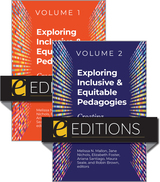
Exploring Inclusive & Equitable Pedagogies
Creating Space for All Learners, 2 volume set
Melissa Mallon
Assoc of College & Research Libraries, 2023
Inclusive and equity-minded pedagogy is inspired by a rich array of theories including Black feminist thought, critical race theory, cultural humility, cultural competence, disabilities studies, universal design for learning, and critical information literacy. When we base our instruction on inclusive and equitable pedagogies, we endeavor to connect authentically with students as well as to connect classroom learning to the context of their lives. We share power with students, centering them and their varied learning preferences, and strive to create a culture of care, empathy, and humility both in and out of the classroom. When we clearly share our objectives and expectations for a learning experience, students may better understand us and the learning context we aspire to create.
In Exploring Inclusive & Equitable Pedagogies: Creating Space for All Learners, seven thorough sections across two volumes examine:
Chapters cover topics including dismantling, reexamining, and reconstructing notions of authority in information literacy instruction; teaching technology inclusively; using primary sources to research queer and feminist histories; cocreating knowledge practices with students; prioritizing accessibility in synchronous and asynchronous learning environments; cultural humility, funds of knowledge, and information literacy instruction with first-generation students; designing and managing inclusive group projects; and much more.
To become the instructors our students need, we must adopt the mindsets and develop the underlying skills to enact inclusive and equitable teaching and learning. Exploring Inclusive & Equitable Pedagogies offers reflections, practices, and models that deepen our collective understanding of equitable and inclusive theories and practices and present new grounding for both our individual teaching and our instruction programs.
In Exploring Inclusive & Equitable Pedagogies: Creating Space for All Learners, seven thorough sections across two volumes examine:
- Anti-Racist Approaches
- Intentional Information Literacy
- Engendering Care and Empathy
- Community Building
- Universal Design for Learning: An Important Benchmark
- Instructor Identity and Positionality
- Professional Development
Chapters cover topics including dismantling, reexamining, and reconstructing notions of authority in information literacy instruction; teaching technology inclusively; using primary sources to research queer and feminist histories; cocreating knowledge practices with students; prioritizing accessibility in synchronous and asynchronous learning environments; cultural humility, funds of knowledge, and information literacy instruction with first-generation students; designing and managing inclusive group projects; and much more.
To become the instructors our students need, we must adopt the mindsets and develop the underlying skills to enact inclusive and equitable teaching and learning. Exploring Inclusive & Equitable Pedagogies offers reflections, practices, and models that deepen our collective understanding of equitable and inclusive theories and practices and present new grounding for both our individual teaching and our instruction programs.
[more]
READERS
Browse our collection.
PUBLISHERS
See BiblioVault's publisher services.
STUDENT SERVICES
Files for college accessibility offices.
UChicago Accessibility Resources
home | accessibility | search | about | contact us
BiblioVault ® 2001 - 2024
The University of Chicago Press









